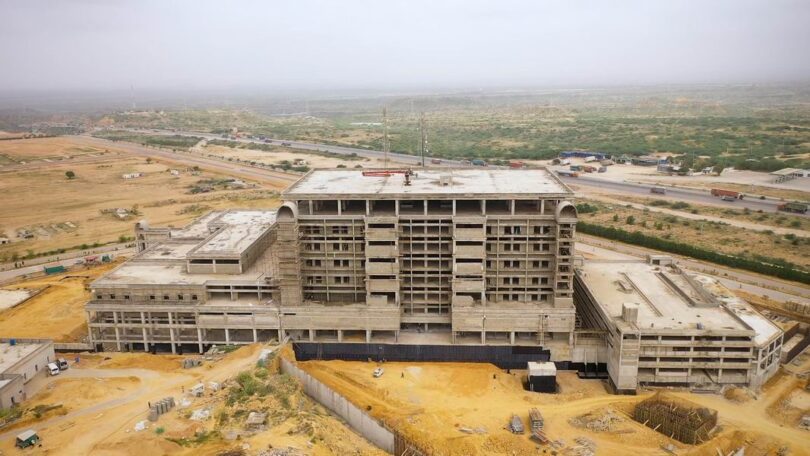.,.,
‘Building SKMCH&RC, Karachi our collective responsibility’
by
The Frontier Post
KARACHI: On the launch of the fundraising campaign for Pakistan’s third Shaukat Khanum Memorial Cancer Hospital and Research Centre (SKMCH&RC), the management of the Hospital said that supporting the Hospital is our collective responsibility and the hospital is expected to open next year.
Updating on the project, the management said, “These are challenging economic times for Pakistan, and it would be wrong to say that we have been unaffected by inflation, devaluation and other issues which have beset us as a nation, of late.
Nevertheless, we remain steadfast in our conviction to deliver a world-class facility in Karachi as soon as practically possible. The physical structure of the Hospital was completed in November 2022 and finishing work at the site in DHA City continues at speed. In total, we need Rs. 21 billion to complete the finishing work and to help install the state-of-the-art equipment for diagnosis and treatment of our patients in Karachi.”
They further added, “Building a cancer hospital in a resource- constrained environment is a huge challenge. Keeping such a facility running, year-on-year, enabling it to grow and develop, to remain at the cutting edge of technology and science, and to continue to treat an ever-increasing number of patients for free, however, is a challenge of an altogether greater magnitude.
The people of Pakistan from all across the world rallied together to build the nation’s first Shaukat Khanum Hospital in Lahore in 1994 and their continued support has ensured the hospital has grown from strength to strength over the last three decades.
The 2nd SKMCH&RC opened in Peshawar in 2015, since close to 30% of the patients seen at SKMCH&RC, Lahore were from KP and Afghanistan. While there are a number of facilities in Karachi that offer quality cancer care, Pakistan’s largest city needs a state-of-the-art tertiary care cancer centre which ensures equal access to all patients, irrespective of their ability to pay.
In order to bridge this gap and to provide free and high-quality cancer care to as many people as possible, we have undertaken the enormous task of constructing our third and Pakistan’s largest cancer hospital in Karachi.
At twice the size of our hospital in Lahore, this hospital will serve not only the city of Karachi, but also patients from elsewhere in Sindh, as well as from Southern Baluchistan.” In a message to the public, SKMCH&RC management said, “Shaukat Khanum belongs to all the people of Pakistan – they built it, they support it and it is only with their ongoing support and generosity that we will see the fruition of the dream of a third cancer hospital, in Karachi.
Each one of you has a vital role to play in fulfilling this dream, and in helping those less fortunate than you to fight the scourge of cancer in Pakistan. You can create a lasting legacy by becoming a Founding Donor or by dedicating rooms in memory of loved ones. Each rupee counts! You can pledge a regular contribution for SKMCH&RC, Karachi, and make an ongoing commitment to help equip the hospital.













